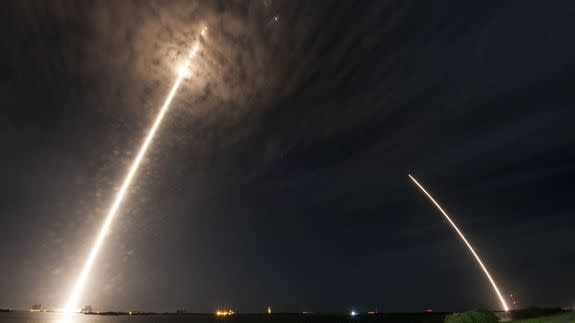SpaceX lands another rocket in Florida after launching mission to space

For the second time ever, Elon Musk's SpaceX has landed one of its Falcon 9 rocket boosters back on land after launching a payload into orbit.
The Falcon 9 took flight at 12:45 a.m. ET Monday carrying an uncrewed Dragon capsule filled with thousands of pounds of supplies and experiments toward the International Space Station for NASA.
SEE ALSO: Elon Musk's SpaceX has chosen a rocket for its first true reusability test
Shortly after launch, the first stage of the rocket, known as the booster, separated and softly touched down on a pad in Florida as part of a spectacular nighttime landing.
This is the second booster SpaceX has brought back to land and the fifth the company has recovered after launching a payload into orbit.
The other three boosters were recovered on a drone ship in the ocean, a landing profile necessary for high-velocity missions that burn a lot of fuel.
Landing pad landings are somewhat easier than landing on a drone ship, because it's an easier target to hit. It does require more fuel for success, however, meaning that for missions that burn a lot of fuel, landing on a drone ship in the sea will be necessary.
SpaceX is performing rocket landings with the goal of eventually reducing the cost of launching to space by reusing rocket bodies for multiple spaceflights.
Currently, rockets are spent after launching one payload to space, but if reusable boosters become a reality, companies that hope to get their wares to space will only need to pay for the cost of the spacecraft and the fuel for launch.
Of course, SpaceX is still a long way from achieving that goal.
The company is expected to re-fly its first landed rocket sometime in September or October, but the actual mission it will launch hasn't yet been decided, according to SpaceX.
Musk's space outfit isn't the only one attempting to make reusable rockets a reality.
Jeff Bezos' company Blue Origin has already flown a suborbital-class rocket four times, but to a much lower altitude than SpaceX.